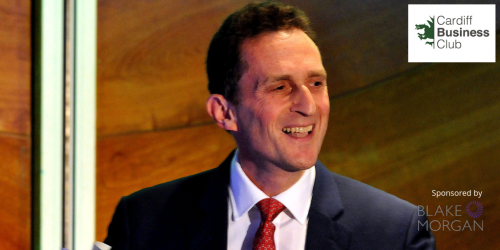News
Cardiff Business Club interviews: Simon Fox
Date Posted: 25 January 2019
On Monday 21st January 2019, the Club was privileged to be given the opportunity to interview that evening's guest speaker, Simon Fox, CEO of Reach plc.
The event, kindly sponsored by Blake Morgan, was attended by over 200 people from across the Weslh capital, making this one of the most popular events of the last 12 months.
In a career spanning three decades and presiding over one of the largest media organisations in Europe, Simon shared with us his views in the shifting media landscape, how the media needs to work harder to regain the public's trust in the wake of so-called 'fake news', and the leadership lessons he has learned that he would pass on to the next generation of business leaders.
We hope you enjoy ithe podcast (10 minutes). CLICK HERE TO LISTEN or alternatively read our account below:
Print is not dead. Far from it, leading newspaper chief tells Welsh business leaders
Last week, Simon Fox, chief executive of Reach plc, addressed over 200 business leaders at Cardiff Business Clubat an event sponsored by Blake Morgan on the current and future prospects for the media.
He explained that while digital technology has altered the media landscape significantly in recent years, traditional formats continue to play an important role in how people consume news:
“Although we [Reach plc] are transforming to a digital media, print retains an unrivalled impact. Newspapers are not going to be around forever, but I do believe they have a longer life than people imagine.
“We’re no longer a newspaper business, we’re a news ‘brand’ organisation and these brands have never had bigger audiences – it is a golden age, with interest in the news never higher.”
One of the biggest challenges currently facing publishers is the perceived lack of trust in the media – so-called ‘fake news’. While recognising the issue as being serious, Mr Fox was keen to stress that this has also created an opportunity, too.
“We have to work very hard to gain trust,” he said. “’Fake news’ has gained ground over the last couple of years, which along with the explosion of social media present a very serious threat to our democracy. But this has also created an opportunity for news brands to rise above all that noise.”
Indeed, in January, the annual Edelman Trust Barometer was published. It shows that on a global level, consumer trust in the media has increased for a second consecutive year. Mr Fox commented: “Our brands stand for something and our journalism is as good as it ever has been, we are regulated and we should be a trusted source of news.
“It is deeply frustrating that millions of people choose to click on stories that are untrue.
“This is not helped by Donald Trump, who simply decides that any news he happens to disagree with is ‘fake’.”
Mr Fox went on to explain that technology, particularly the use of artificial intelligence (AI) is enabling media owners to personalise the news. As such, it is essential to stay “abreast of technology and keep investing in it…[and] “assume that the rate of change will accelerate, not decelerate.”
This prompted the question as to how much the media sector has been disrupted – what impact has the likes of HuffPost and Buzzfeed, for instance, had on the sector? “We haven’t been,” he said. “Certainly not in the same way that Spotify disrupted the music industry, or AirBnB has impacted accommodation.
“The big digital news players are actually the BBC, MailOnline and ourselves. The traditional news brands have responded in a positive way to digital change.”
Closing his address to members of Cardiff Business Club, Mr Fox concluded with the quip: “Mark Twain famously said that reports of my death have been greatly exaggerated, the same applies to print.”
